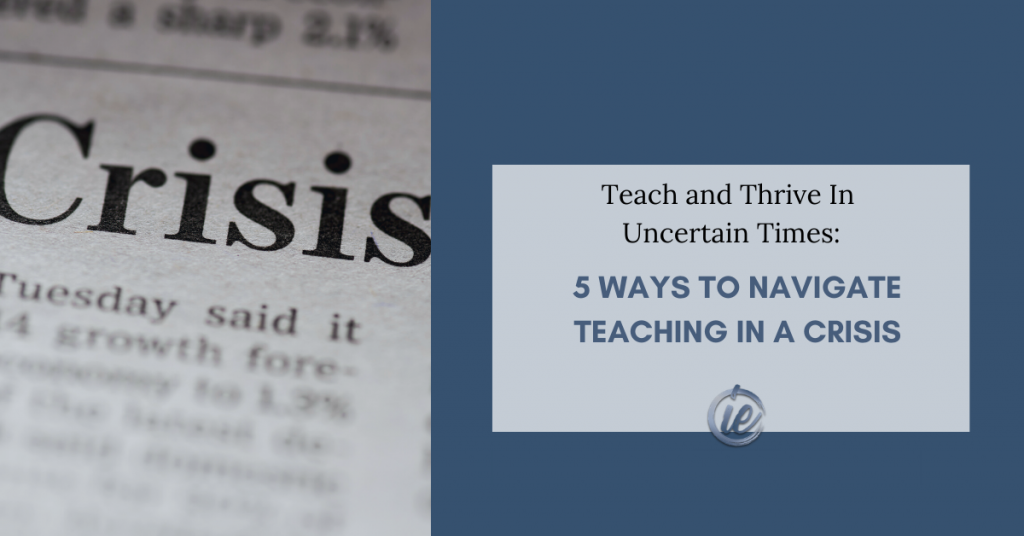Teach and Thrive In Uncertain Times: 5 Ways to Navigate Teaching in a Crisis
2020 has already been a history-making year. With the onslaught of COVID-19 sweeping across the world creating a global pandemic, our daily lives have all been altered in so many unexpected ways.
As teachers and educators, no one could have possibly imagined that the state of traditional teaching would change so quickly within a month’s time. In my district alone, we shifted from the traditional classroom setting to supplemental learning and then full-time distance learning all within a month’s time. With that shift bought a lot of anxiety, fear, unrest, and stress for teachers and educators trying to adjust and teach in this new remote learning environment, while caring for their own families at home as well.

As you continue to move forward, teaching through this pandemic, here are 5 ways to help you teach and thrive and navigate through this time of uncertainty.
Focus On What You Can Control
When teaching during this time of uncertainty our natural tendency is to focus on all the things that are not in our control. This approach brings with it stress and anxiety.
During this turbulent time, one of the most important things you can do as a teacher is to focus on what you can control.
For instance, in distance learning you can’t control your district’s requirements for virtual teaching or whether or not your students show up and complete their online assignments and virtual meet-ups.
However, you can control the lessons you assign, how you connect, and engage your students and their parents in this new and sometimes unfamiliar learning environment, and the attitude you show up with every day to serve them.
This is where your focus should lie…
Here’s a quick activity to do. Make 2 lists. One list has all the things you can control teaching in these uncertain times. On the other list write what you can’t control. Then, acknowledge what you can’t control, but put your time and energy into the list of things you can control.
Adjust your expectations
The shift to distance learning during this crisis creates a rapid learning curve for everyone. So, in order to teach and thrive in this uncertain time you will need to adjust your expectations to meet the realistic demands of this time.
In other words, give yourself a healthy dose of Grace.
Often as teachers and educators, we want the new learning to be simple and easy, while continuing to teach how we did in the traditional classroom.
Unfortunately, this mindset won’t work. Learning new digital platforms like, Google Classroom,
Seesaw, Zoom, and Google Hangouts can take time and be quite frustrating, especially if you are not tech savvy.
In addition, students and parents have to learn and navigate this new distance learning environment as well.
As a teacher and educator, you may be teaching from home and also helping your own children with their distance learning assignments.
Equity is so important during this time. Not all students and their families have access to computers and/or internet connections to be able to even engage in remote learning. Some parents also have multiple kids engaged in distance learning while having to work to provide for their families. Others have students with special learning needs that make it challenging to be fully present all the time.
Adjusting your expectations of what can be accomplished by yourself and your students is crucial.
Also, be willing to pivot from week to week as you see how parents and students respond to distance learning and the expectations being placed upon them.
During these turbulent times, less is more.
So, adjust your expectations and give yourself grace in the process. Some things won’t get done or completed in the time period you may have had planned and that is totally alright.
Implement One Thing At A Time
When teaching during this time of uncertainty, there may be many different tasks to accomplish during the course of a day and the week.
With so much to do like teaching lessons, calling parents, meeting with students, grading student work online, writing IEPS and holding the virtual meetings, and assisting your own children with their own assignments, the overwhelm of it all can be paralyzing.
Instead of moving forward in getting things done, you can feel stuck and unproductive.
During these times, I recommend implementing the “TNT” strategy.
“TNT” stands for the “The Next Thing.” How do you implement this “TNT” strategy?
When you feel yourself getting very overwhelmed by all the tasks in front of you, ask yourself this question, “What is the next (most important) thing /action I need to take right now to move forward?”
Then, put all of your energy and attention into that “thing or action” and go do it!!!
This will help you stay engaged and focused on the task at hand and help reduce a lot of the overwhelm in the moment.
So, “What is the next (most important ) thing/action you need to take right now to move forward?
Take care of yourself
If you want to navigate teaching and thriving during these uncertain times, then one of the single most important priorities should be your own self-care.
Each day you have responsibilities placed upon you and people you are called to serve including your own family, your students, and their families, colleagues, and admin. While it is a joy to serve others, it can also be draining.
To borrow an illustration from the airline industry, you have to put the oxygen tank on yourself first before you put it on the child sitting next to you or anyone else for that matter.
Here’s an illustration I want you to ponder…Imagine you have a bucket full of water and a dry sponge. At the beginning of the week you soak that dry sponge in the water and saturate it to the fullest extent. Then, each day you take that sponge and squeeze it out a little each day, sometimes more until there is nothing left at the end of the week. Unless you dip it back into the water bucket often, you will be working with a dry sponge that is not very effective to do its job.
That bucket is your own self-care and you are the sponge…Unless you fill your bucket often with things that feed your own soul, not others, you are in danger of becoming that dry sponge trying to pour out something that isn’t there.
So, in the midst of the uncertainty during these times, what are some small things you will do often to feed your soul?
Here is a shortlist of ideas to get started: take a walk, jog, do yoga, read, listen to music, watching a favorite show, prayer, meditation, work on a specific hobby, and so forth…
Doesn’t matter what you do. Just fill yourself up regularly.
Have a supportive community
One element of self-care is drawing strength through authentic relationships. Whether you are an extrovert or an introvert, we all need connections that fill us up.
Social support networks create a natural community. That supportive community can be found through other teachers and educators, spouses and partners, extended family, close friends, or faith-based groups.
Who are the people you turn to for community and support?
In closing, as you navigate these turbulent times, here is a recap of the 5 ways you can teach and thrive in the midst of uncertainty:
F ocus On What You Can Control
A djust your expectations
I mplement one thing at a time
T ake care of yourself
H ave a supportive community
